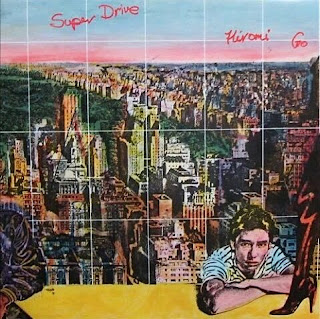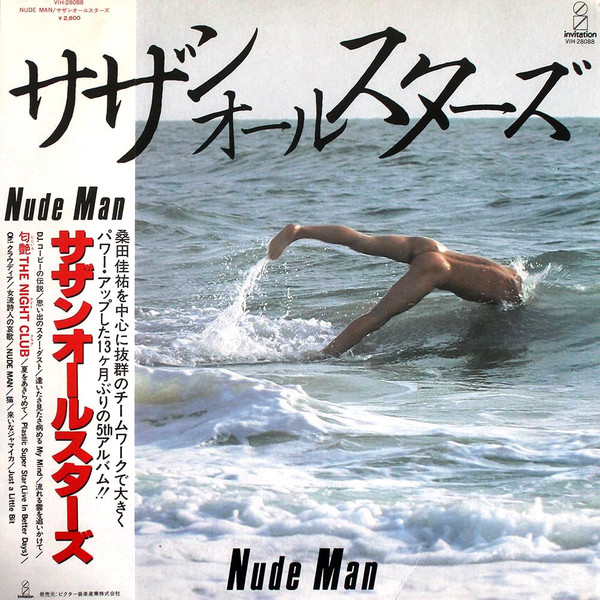 Hideki Saijo(西城秀樹) is the name that pops up when people talk about male idols, seeing how he was the most popular one. However, Saijo had a few rivals in the male idol scene in Japan, one of them being singer & actor, Hiromi Go(郷ひろみ).
Hideki Saijo(西城秀樹) is the name that pops up when people talk about male idols, seeing how he was the most popular one. However, Saijo had a few rivals in the male idol scene in Japan, one of them being singer & actor, Hiromi Go(郷ひろみ). In his debut in the 70s, Hiromi Go was part of the new wave of musical talent then known as the "New Big Three" (新御三家, Shin Gosanke), along with Goro Noguchi (野口五郎) and Hideki Saijo. He got his start with the Johnny & Associates talent agency, creating for the most pop pretty standard teenybopper idol pop. it wasn't until his 20th album that he would finally tackle the City Pop genre in his 1979 album, Super Drive.
Like many Japanese artists who decided to make the transition into the urban contemporary, Go took to New York City, New York, to record his very first overseas album. The backing band for this album was none other than the 24th Street Band, a fusion band that had a decent following in Japan and featured a roster of prolific session musicians. Jazz-fusion guitarist Hiram Bullock released his own series of jazz-funk albums in Japan, as well as participated with other artists such as Billy Joel, Steely Dan, and Miles Davis. Bassist Will Lee is best known for his work on the CBS Television program The Late Show with David Letterman as part of the CBS Orchestra. Drummer Steve Jordan played with the Blues Brothers band for the Blues Brothers movie soundtrack. Keyboardist Clifford Carter is known for performing with artists like Bruce Springsteen, James Taylor, and Art Garfunkel, as well as being a member of the jazz-fusion band The Elements, and at one point the Saturday Night Live Band.
The album was produced by Japanese popular composer, arranger & producer Hagita Mitsuo(萩田光雄), featuring songs composed by Mitsuo, singer-songwriters Fujimaru Yoshino (芳野藤丸), Tetsuji Hayashi (林哲司), and Susumu Agawara (菅原進) from the folk band Billy Ban Ban. The jacket art was designed by acclaimed graphic designer Tadanori Yokoo (横尾忠則).
THE MUSIC
- Chaoyang Prologue (朝陽のプロローグ) ⭐⭐⭐⭐
- My Lady ⭐⭐⭐⭐⭐
- Wanna Be True ⭐⭐⭐⭐
- When You Can See The Horizon (地平線の見える時) ⭐⭐⭐⭐
- Someone Like You (君に似た誰かが) ⭐⭐⭐
- Feel Like Goin' Home: To The City Where Dreams Live (夢が住む街へ) ⭐⭐⭐⭐
- Nightlife (夜遊び) ⭐⭐⭐
- By The Bay (入江にて) ⭐⭐⭐⭐⭐
- Sorrow New York (哀愁ニューヨーク) ⭐⭐⭐
- Lonely Night ⭐⭐⭐⭐⭐
THE VERDICT
New York seems to be the go-to theme for a lot of early 70's New Music/City Pop albums, but I think Super Drive pulls it off pretty well. It's got your typical mix of disco, Latin, funk, soul, and smooth jazz numbers that all excel at evoking that big-city feel. The only thing that took me some getting used to was Hiromi Go's vocals, which if I didn't know better, I would have assumed he sucked in a helium balloon before entering the recording booth. Jokes aside, I found his singing to be pretty smooth throughout.
Songs like Feel Like Going Home and Wanna Be True are funky soul tunes that are the perfect backdrop for an afternoon strut through Manhattan. When You Can See The Horizon takes you to Spanish Harlem with a cool samba number with a great horn section and a groovy guitar solo. Someone Like You is a romantic ballad that's great for looking over the New York Skyline from the Empire State building with that special someone. My favorite track is Lonely Night, a fantastic jazzy ballad that showcases Go's singing chops incredibly well. I love how the orchestration swells up as the song progresses, I almost wish Go gave us a nice falsetto to cap off the song, instead, he continues to sing the chorus in the same tone, which was a bit disappointing, but the song itself is still great. Sorrowful New York takes a detour into Greenwich Village with a bluegrassy folk number that I can only assume harkens back to the heyday of Bob Dylan, which still fits the New York aesthetic pretty well.
Super Drive is an all-around decent album and a great introduction to Hiromi Go if you're trying to get into his music. If you're already a Go fan, this is a must-have in your collection.





No comments:
Post a Comment